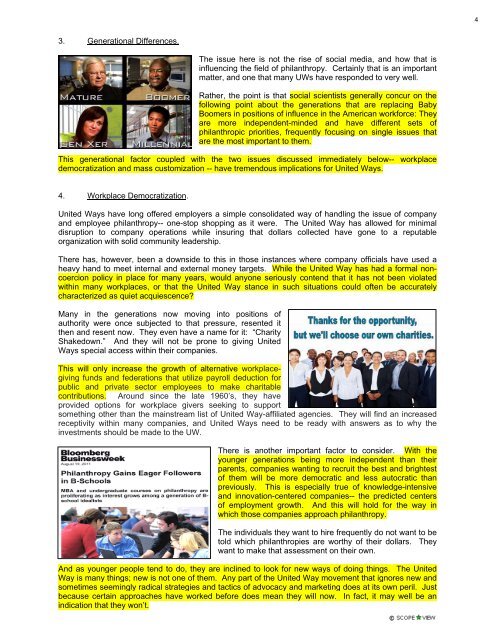Closing Session with Bill Millett â Scope View Strategic Advantage
Closing Session with Bill Millett â Scope View Strategic Advantage
Closing Session with Bill Millett â Scope View Strategic Advantage
You also want an ePaper? Increase the reach of your titles
YUMPU automatically turns print PDFs into web optimized ePapers that Google loves.
43. Generational Differences.The issue here is not the rise of social media, and how that isinfluencing the field of philanthropy. Certainly that is an importantmatter, and one that many UWs have responded to very well.Rather, the point is that social scientists generally concur on thefollowing point about the generations that are replacing BabyBoomers in positions of influence in the American workforce: Theyare more independent-minded and have different sets ofphilanthropic priorities, frequently focusing on single issues thatare the most important to them.This generational factor coupled <strong>with</strong> the two issues discussed immediately below-- workplacedemocratization and mass customization -- have tremendous implications for United Ways.4. Workplace Democratization.United Ways have long offered employers a simple consolidated way of handling the issue of companyand employee philanthropy-- one-stop shopping as it were. The United Way has allowed for minimaldisruption to company operations while insuring that dollars collected have gone to a reputableorganization <strong>with</strong> solid community leadership.There has, however, been a downside to this in those instances where company officials have used aheavy hand to meet internal and external money targets. While the United Way has had a formal noncoercionpolicy in place for many years, would anyone seriously contend that it has not been violated<strong>with</strong>in many workplaces, or that the United Way stance in such situations could often be accuratelycharacterized as quiet acquiescence?Many in the generations now moving into positions ofauthority were once subjected to that pressure, resented itthen and resent now. They even have a name for it: “CharityShakedown.” And they will not be prone to giving UnitedWays special access <strong>with</strong>in their companies.This will only increase the growth of alternative workplacegivingfunds and federations that utilize payroll deduction forpublic and private sector employees to make charitablecontributions. Around since the late 1960’s, they haveprovided options for workplace givers seeking to supportsomething other than the mainstream list of United Way-affiliated agencies. They will find an increasedreceptivity <strong>with</strong>in many companies, and United Ways need to be ready <strong>with</strong> answers as to why theinvestments should be made to the UW.There is another important factor to consider. With theyounger generations being more independent than theirparents, companies wanting to recruit the best and brightestof them will be more democratic and less autocratic thanpreviously. This is especially true of knowledge-intensiveand innovation-centered companies-- the predicted centersof employment growth. And this will hold for the way inwhich those companies approach philanthropy.The individuals they want to hire frequently do not want to betold which philanthropies are worthy of their dollars. Theywant to make that assessment on their own.And as younger people tend to do, they are inclined to look for new ways of doing things. The UnitedWay is many things; new is not one of them. Any part of the United Way movement that ignores new andsometimes seemingly radical strategies and tactics of advocacy and marketing does at its own peril. Justbecause certain approaches have worked before does mean they will now. In fact, it may well be anindication that they won’t.©


